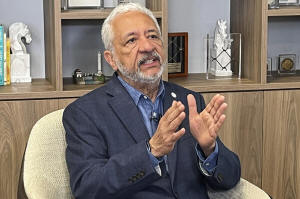Panama Canal administrator pushes back against Trump's assertions of
Chinese meddling
 Send a link to a friend
Send a link to a friend
 [January 11, 2025]
By ALMA SOLÍS [January 11, 2025]
By ALMA SOLÍS
PANAMA CITY (AP) — The administrator of the Panama Canal said Friday
that the vital waterway will remain in Panamanian hands and open to
commerce from all countries, rejecting claims by President-elect Donald
Trump that the United States should take it over.
In an interview with The Associated Press, Ricaurte Vásquez denied
Trump’s claims that China was controlling the canal’s operations, and
said making exceptions to current rules concerning its operation would
lead to “chaos.”
He said Chinese companies operating in the ports on either end of the
canal were part of a Hong Kong consortium that won a bidding process in
1997. He added that U.S. and Taiwanese companies are operating other
ports along the canal as well.
Trump has gone so far as to suggest the U.S. should take back control of
the canal and he would not rule out using military might to do so.
“It might be that you’ll have to do something,” Trump said Tuesday. “The
Panama Canal is vital to our country.” Trump has characterized the fees
for transiting the canal that connects the Atlantic and Pacific Oceans
as “ridiculous.”
Panama President José Raúl Mulino has said unequivocally that the canal
will remain in Panamanian hands.
Responding to the suggestion that the U.S. could try to retake control
of the canal, Vásquez said there was “no foundation for that sort of
hope. That is the only thing I can say.”
Vásquez stressed that the Panama Canal was open to the commerce of all
countries.

The canal can’t give special treatment to U.S.-flagged ships because of
a neutrality treaty, Vásquez added. “The most sensible and efficient way
to do this is to maintain the established rules.”
Requests for exceptions are routinely rejected, because the process is
clear and there mustn’t be arbitrary variations, he said. The only
exception in the neutrality treaty is for American warships, which
receive expedited passage.
[to top of second column]
|

Panama Canal Administrator Ricaurte Vásquez addresses
President-elect Donald Trump's suggestion that the U.S. should
retake control of the Panama Canal during an interview with
Associated Press in his office Friday, Jan. 10, 2025, in Panama
City, Panama. (AP Photo/Abraham Terán)

Some 70% of the sea traffic that crosses the Panama Canal leaves or
goes to U.S. ports.
The United States built the canal in the early 1900s as it looked
for ways to facilitate the transit of commercial and military
vessels between its coasts. Washington relinquished control of the
waterway to Panama on Dec. 31, 1999, under a treaty signed in 1977
by President Jimmy Carter.
Last month, Trump told supporters “We’re being ripped off at the
Panama Canal.” He claimed that the U.S. “foolishly gave it away.”
Regarding the fees for using the canal, Vasquez said a planned
series of increases had concluded with one this month. Any
additional increases would be considered in the first half of the
year to give clients certainty in their planning and would go
through a public comment process, he said.
“There’s no discrimination in the fees,” he said. “The price rules
are uniform for absolutely all those who transit the canal and
clearly defined.”
The canal depends on reservoirs to operate its locks and was heavily
affected by drought during the past two years that forced it to
substantially reduce the number of daily slots for crossing ships.
With fewer ships using the canal each day, administrators increased
the fees that are charged all shippers for reserving a slot.
The canal bisects Panama, running 51 miles end to end. It allows
ships to avoid the longer and costlier trip around Cape Horn at the
tip of South America.
“It is an enormous responsibility,” Vásquez said of Panama’s control
of the canal. “Take the case of COVID, when it arrived, the canal
took the necessary measures to protect the labor force, but while
keeping the canal open, because the international commitment is to
keep it open.”
All contents © copyright 2024 Associated Press. All rights reserved |